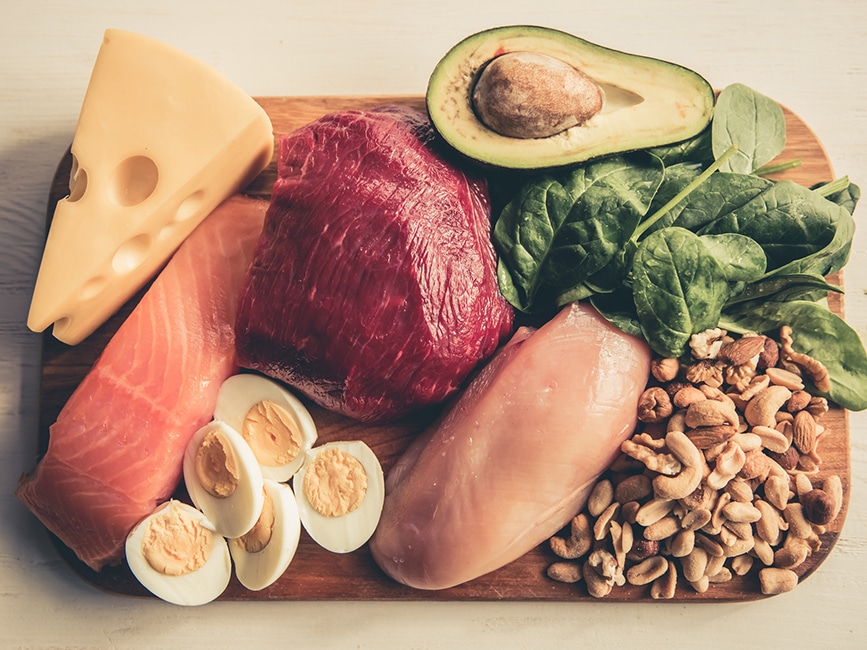The Connection Between Sleep and Gut Health
Adopt eating habits that support your microbiome—and your sleep.

Do you have trouble sleeping? If so, you may want to consider the link between sleep and gut health. There’s more to this topic than munching too many chips while binge-watching a favorite show and then tossing and turning all night.
Home to thousands of bacteria that make up the microbiome, the gut affects appetite, metabolism, weight management, and whether or not you can sleep soundly at night.
How does the gut impact sleep? What strategies can you use to enhance the gut-sleep connection? Teri Mosey, PhD, a holistic nutrition consultant with 25 years in the health and fitness industry, offers an introduction into this complex topic.
Intro to the Gut Biome
The gut has its own brain, nervous system and ability to work independently of the neocortex (rational or thinking) brain. This gut-brain regulates immunity, coordinates neurotransmitter and hormone secretions, influences emotions, affects threshold sensitivity to pain, and supports decision-making and sleep patterns (Liu & Zhu 2018; Rosselot, Hong & Moore 2016).
When it comes to sleep deprivation, there’s a direct connection between gut and brain. If the microbiome is not nurtured properly through eating and lifestyle actions, the change in microbe composition can initiate sleeping problems.
See also: You Are How You Sleep: The Cost of Sleep Deprivation
Eat a Plant-Based Diet
Adopting eating habits that support the microbiome may help regulate and improve sleep patterns. Researchers are finding that eating a primarily plant-based diet helps to regulate blood sugar levels and stimulate production of the neurotransmitters serotonin and melatonin, thereby calming the nervous system and helping us get to sleep and stay asleep (Islam et al. 2015; Strasser, Gostner & Fuchs 2016).
Plants contain phytonutrients, health-supportive compounds that boost antioxidant capacity and strengthen immunity. Immunity is one of the main pathways in the link between sleep and gut health. Eating a plant-based diet also creates a nutrient profile that is higher in complex carbohydrates and fiber and lower in saturated fats. Research is demonstrating that this combination decreases the number of nighttime arousals and supports longer periods spent in the deep NREM sleep stage (St-Onge et al. 2016).
Other Eating Suggestions
In addition to eating a plant-based diet, consider the following nutritional strategies:
Add small amounts of fermented foods. Adding small amounts of fermented foods to our diet can boost sleep. Raw, unpasteurized, naturally fermented sauerkraut, tempeh, miso and apple cider vinegar are all options.
Minimize caffeine consumption. If you struggle with insomnia, avoid caffeinated beverages until your sleep improves. Otherwise, drink a morning cup of coffee or other caffeine-infused beverage no less than 10 hours prior to bedtime. Ten hours is how long it takes to metabolize caffeine out of your system. While making this adjustment, pay attention to staying hydrated, as that also influences sleep quality.
Make dinner the smallest meal. The body has internal physiological processes and cycles that happen at precise times of the day. Since the digestive system is most active during earlier parts of the day, lunch is ideally the largest meal and dinner the smallest. Consider a soup or snack for dinner no later than 7 p.m. in preparation for the body’s evening healing and restorative processes.
References
Islam. J., et al. 2015. Simultaneous analysis of serotonin, tryptophan and tryptamine levels in common fresh fruits and vegetables in Japan using fluorescence HPLC. Food Bioscience, 13 (1), 56–59.
Liu, L., & Zhu, G. 2018. Gut-brain axis and mood disorder. Frontiers in Psychiatry, 9 (223) 1–8.
Rosselot, A.E., Hong, C.I., & Moore, S.R. 2016. Rhythm and bugs: Circadian clock, gut microbiota, and enteric infections. Current Opinion in Gastroenterology, 32 (1), 7–11.
St-Onge, M.P., et al. 2016. Fiber and saturated fat are associated with sleep arousals and slow wave sleep. Journal of Clinical Sleep Medicine, 12 (1), 19–24.
Strasser, B., Gostner, J.M., & Fuchs, D. 2016. Mood, food, and cognition: Role of tryptophan and serotonin. Current Opinion in Clinical Nutrition & Metabolic Care, 19 (1), 55–61.
Teri Mosey, PhD
Teri Mosey is the founder of Holistic Pathways and has been working in various arenas of the health and fitness industry since 1996. Her knowledge and experience has developed over the years to include studies of Eastern and Western philosophies, yogic perspectives, energy medicine, meditative practices and culinary exploration. Through personal and group dynamics, Teri provides supportive and resourceful environments to assist others in discovering their personal path to wellness. She presents alternative perspectives of biochemistry, human physiology and nutrition by incorporating the principles of holistic living into her work. Teri believes with a dynamic foundation of knowledge combined with personal responsibility and freedom of choice, we can all recognize the power within us to co-create our health and ultimately our lives.





